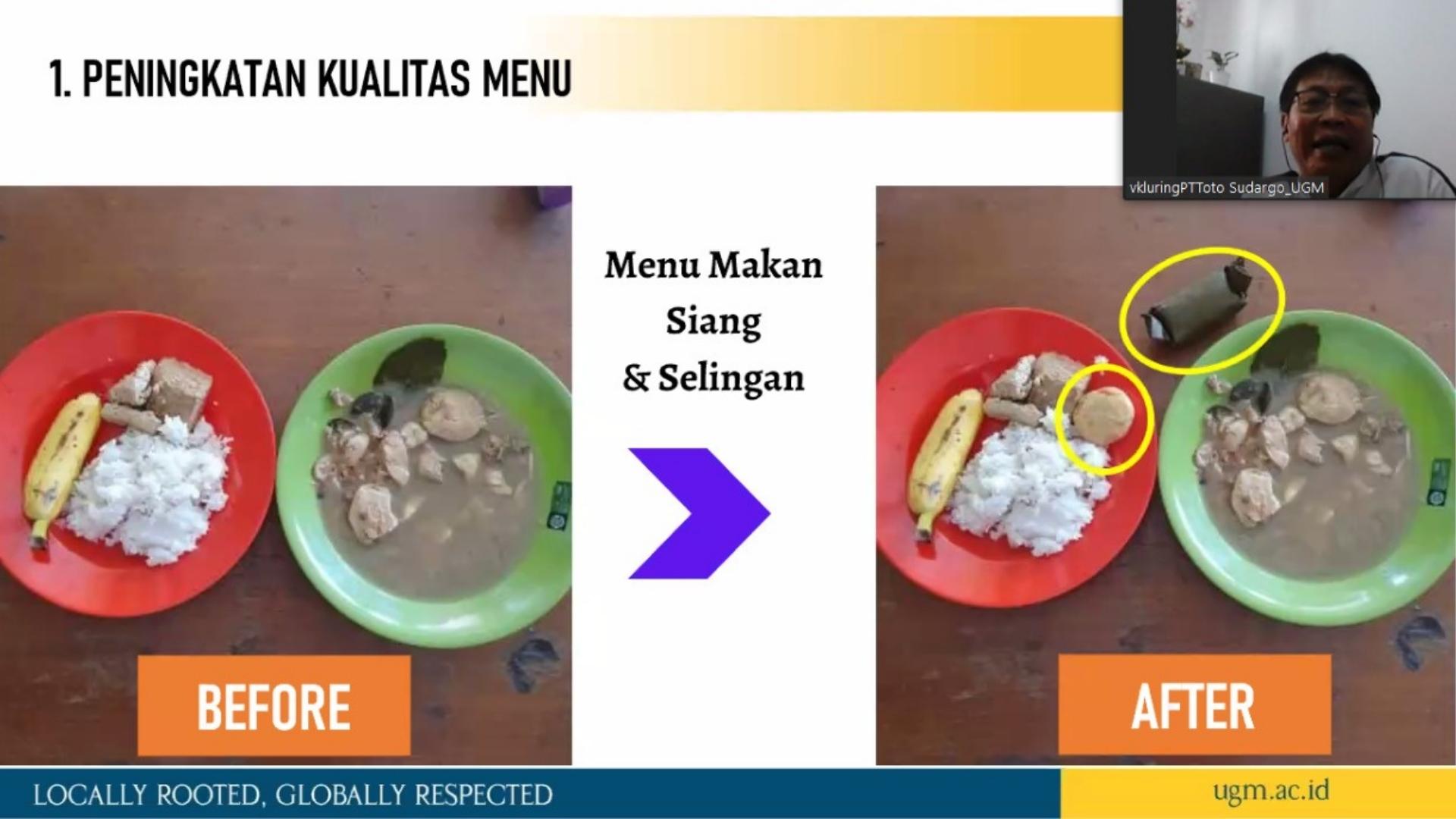The elderly must improve their quality of life. An increase in appetite helps in fulfilling a good nutritional intake, which leads to an improvement in the physical condition and quality of life of the elderly. "Data from the Central Statistics Agency (BPS) recorded that in 2020, the number of elderly people in Indonesia increased by 9.92% or as many as 26.82 million people. Growing old is certain, but being healthy in old age is a choice. Nutrition is part of the health process for the elderly,” said Dr. Toto Sudargo, M.Kes – Lecturer of Health Nutrition, Faculty of Medicine, Public Health and Nursing, Gadjah Mada University, Yogyakarta at the webinar “The Role of Nutrition and Umami in Hypertension Prevention and Improving the Quality of Life for the Elderly”. The event, which was the result of the collaboration of a research team from Gadjah Mada University and PT AJINOMOTO INDONESIA (Ajinomoto) supported by the DIY Social Service and PPNI DIY, was warm and attended virtually by more than 200 participants.
Endang Patmintarsih, S.H, M.Si – Head of the DIY Social Service in his remarks at the beginning of the event said, “As they get older, the elderly have setbacks, especially in terms of their health. But regardless of one's age, good nutrition is needed to grow healthy. Elderly people tend to experience a decrease in the sensitivity of the sense of taste, so they often lose their appetite. Worse, because of the lack of sensitivity to taste – salt tends to be added to food. Whereas salt is a component that needs to be limited, especially for those who are elderly.” In addition to an unhealthy diet, lacking in fiber, and high in fat, salt is one of the triggers for hypertension.
As noted in Basic Health Research (Riskesdas) 2018, the risk of degenerative diseases (cancer, stroke, kidney disease, diabetes mellitus, heart disease, and hypertension) in 2018 increased compared to 2013. One of the factors caused by uncontrolled hypertension is increasing age. The age factor can indeed be a cause of hypertension in the elderly. However, that does not mean this health problem can not be prevented. Replacing and improving food intake with nutritionally balanced foods is one way. The decrease in appetite in the elderly is a challenge in itself, because with age the elderly experience a decrease in appetite (reduction in the amount of food intake and certain types of food). In addition, consumption of unhealthy foods by consuming sugar, sodium, excess fat is another nutritional problem for the elderly.
This webinar organized by Ajinomoto is a continuation of the 'Elderly Project' research conducted by Ajinomoto and the research team from Gadjah Mada University (UGM) led by Dr. Toto Sudargo, M.Kes. The “Elderly Project” was conducted in October 2021 – January 2022, using a purposive sampling method, the research location being the Tresna Werdha Social Service Center (BPSTW) Abiyoso Unit and BPSTW Budi Luhur – Yogyakarta. This study aims to determine whether the provision of food programs that contain high protein, energy, vitamins, and minerals but low in salt, sugar, and fat, as well as nutrition education can improve the nutritional status of the elderly which leads to an increase in their quality of life.

“The Elderly Project study conducted with Ajinomoto showed that after being given a feeding program for the elderly and nutrition education, there was a significant decrease in blood sugar levels. This is shown from the percentage of elderly men who have HbA1C values in the diabetic group, which is 52.9%, down to 23.5% and the increase in the normal group with a percentage of 14.7% rising to 47.1%. Nutrition education about the importance of maintaining a healthy diet such as reducing sugary foods can significantly reduce blood sugar levels. Significant increase in protein intake occurred in both male and female elderly groups,” said Dr. Toto.
The results of the "Elderly Project" research conducted by Ajinomoto and UGM also showed that a low-salt menu in the feeding program was proven to reduce blood pressure in the elderly, namely SBP (Systolic Blood Pressure) and DPB (Diastolic Blood Pressure). This project is one of Ajinomoto's ways to introduce the Bijak Garam campaign to the public, especially the elderly. Previously, the kitchen staff at BPSTW Unit Abiyoso and Budi Luhur had been given education about the importance of a low-salt diet, especially in the elderly diet. Reducing the use of salt and adding the umami seasoning from Ajinomoto products can help reduce the sodium intake of the elderly. By applying this method at the Abiyoso and Budi Luhur BPSTW Units, the appetite of the elderly did not decrease because the taste of the food given to the residents of the orphanage proved to be still delicious even though the salt content decreased compared to before.
"Through today's event, we want to provide an understanding to the wider community that even at an old age people can still improve their quality of life and healthy life expectancy, by maintaining a balanced nutritional intake and also reducing sugar, salt and fat intake. Currently, Ajinomoto is actively campaigning for the Salt Wisdom. Through the Bijak Garam campaign that we are running, Ajinomoto wants to educate the public about the importance of a low-salt diet and invite Indonesian families to live healthier lives by reducing the intake or use of salt in food processing, but still getting a high taste. This campaign is also a testament to our commitment to continue to make a positive contribution to society, by improving the welfare and health of Indonesian families through high quality products and services,” said Grant Senjaya – Head of Public Relations Department PT AJINOMOTO INDONESIA.